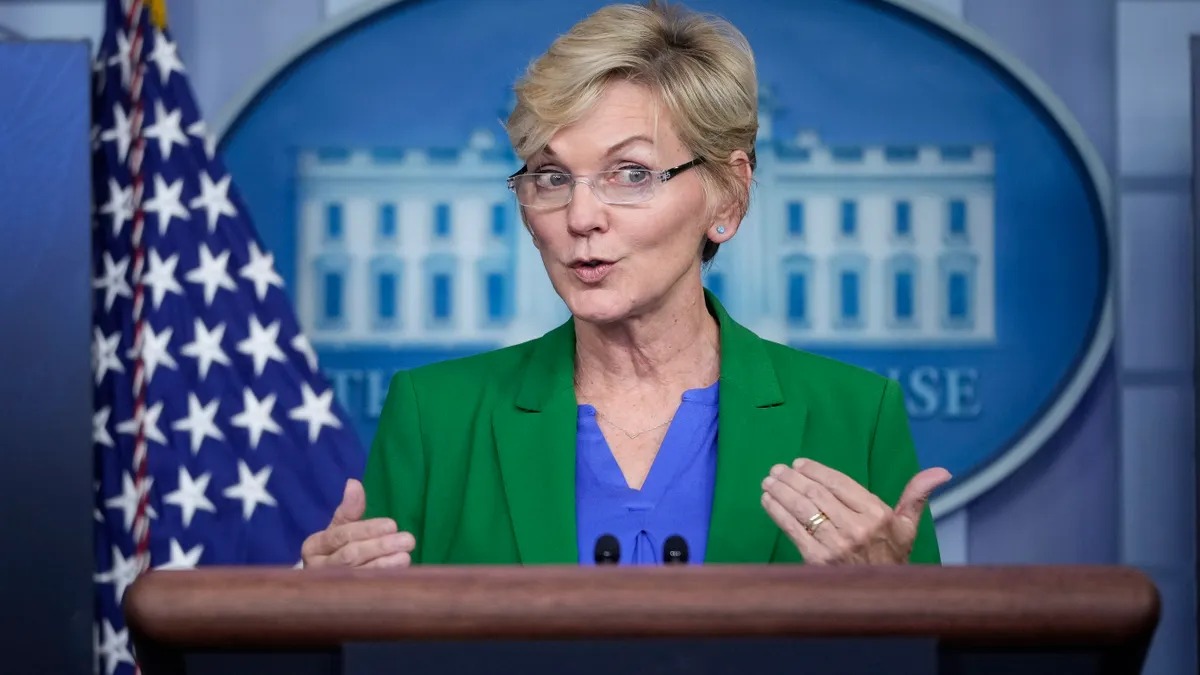Dive Brief:
- The U.S. Department of Energy on Thursday unveiled a $15.5 billion funding package to speed the nation’s transition to electric vehicles, including support for battery manufacturing and retrofitting auto plants.
- The funding includes $2 billion in grants and up to $10 billion in loans to support converting traditional automotive manufacturing facilities to produce EVs. Preference will be given to projects that maintain collective bargaining agreements and provide better labor conditions.
- DOE also intends to make $3.5 billion available to grow domestic battery production and raw materials processing. “We have historically relied on other countries for battery parts. No more,” Secretary of Energy Jennifer Granholm said in a call with media to announce the funding.
Dive Insight:
The U.S. is now “firmly in the implementation phase” of investments stemming from the Inflation Reduction Act and bipartisan infrastructure law, Granholm said.
“In just two years, we've seen announcements of more than $143 billion in clean energy manufacturing. So we know that the clean energy economy is changing before our eyes,” she said. “But it's so important to remember that you don't always have to reinvent the wheel — instead, you can realign it.”
That realignment means transitioning U.S. auto manufacturing facilities to produce emissions-free vehicles, while also bolstering domestic supply chains for batteries and other essential technologies.
DOE will make up to $10 billion available under the Advanced Technology Vehicles Manufacturing Loan Program for conversion projects “that retain high-quality jobs in communities that currently host manufacturing facilities,” the agency said.
Examples of how the funds can be used include “retaining existing workers, providing high wages and benefits, including workplace rights, or commitments such as keeping the existing facility open until a new facility is complete, in the case of facility replacement projects,” DOE said. The agency is accepting applications now.
Another $2 billion funding opportunity is available to encourage the conversion of “long-standing facilities to manufacture electric vehicles and components.” The program will give “particular attention to communities supporting facilities with longer histories in automotive manufacturing,” DOE said.
“While we retrofit factory floors we also need to retain and retrain and rehire those workers with the same or higher wages,” Granholm said. “We are going to focus on financing projects that are in longstanding automaking communities that keep folks already working on the payroll, [and] projects that advance collective bargaining agreements that create high paying long lasting jobs.”
The United Auto Workers union celebrated the funding announcement, which officials said helps tie stronger labor standards to taxpayer funded projects.
The Biden administration is rejecting “the false choice between a good job and a green job,” UAW President Shawn Fain said in a statement. “The EV transition must be a just transition that ensures auto workers have a place in the new economy.”
DOE’s funding announcement also included a notice of intent to provide $3.5 billion through the bipartisan infrastructure law to grow battery manufacturing and domestic supply chains. It follows a similar effort last year that led to 20 companies receiving $2.8 billion for battery production.
“This kind of this funding is going to help us create a resilient, domestic supply chain for batteries that power EVs and our nation's grid,” Granholm said. “And in keeping with our commitment to America's workers, we're going to prioritize projects that lift energy communities and empower workers who have a strong voice in the workplace and in this transition.”
Deadlines for concept papers and full applications have not been set. The agency expects to make up to 41 awards in the form of grants, in amounts from $50 million to $300 million.















